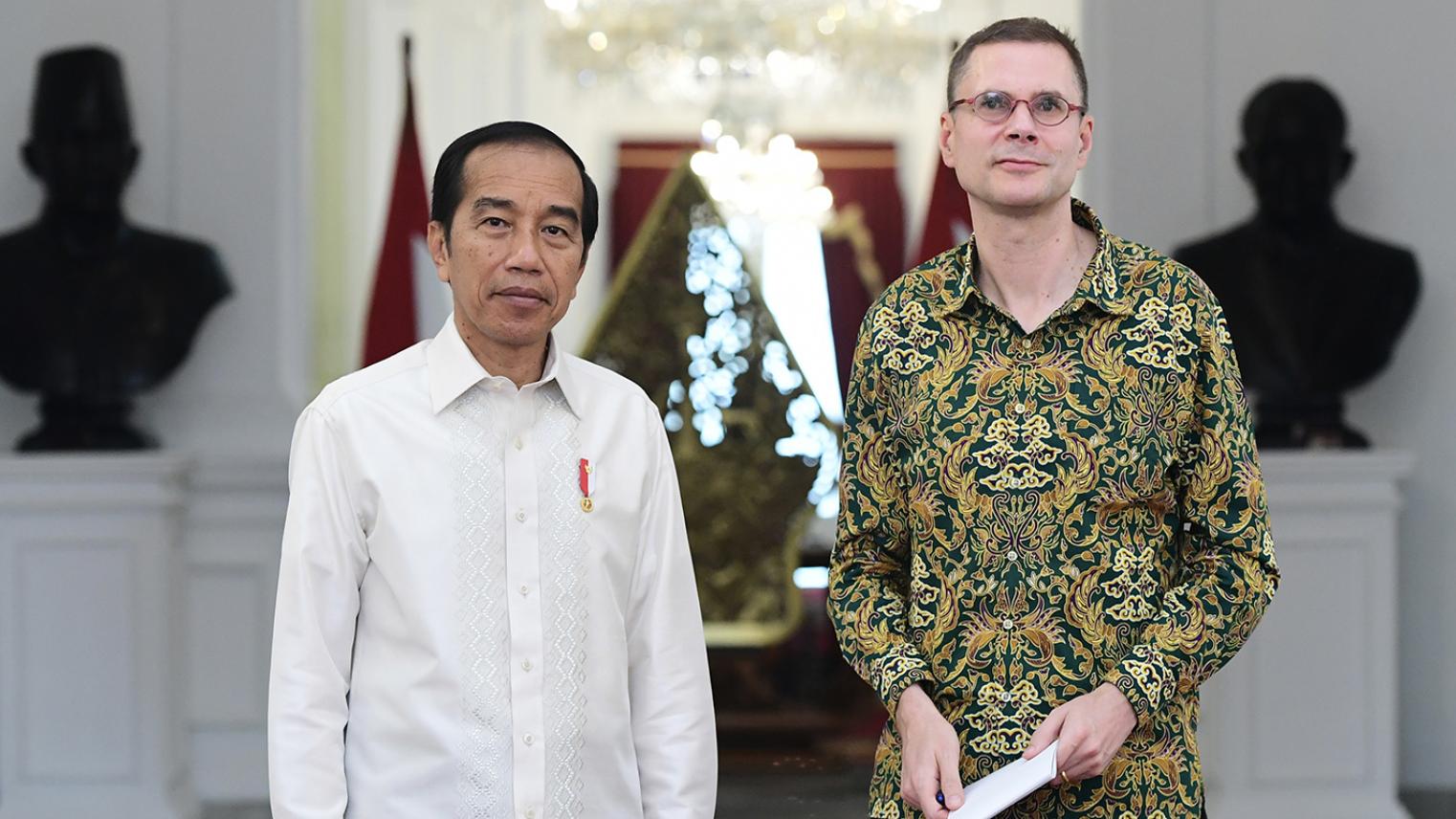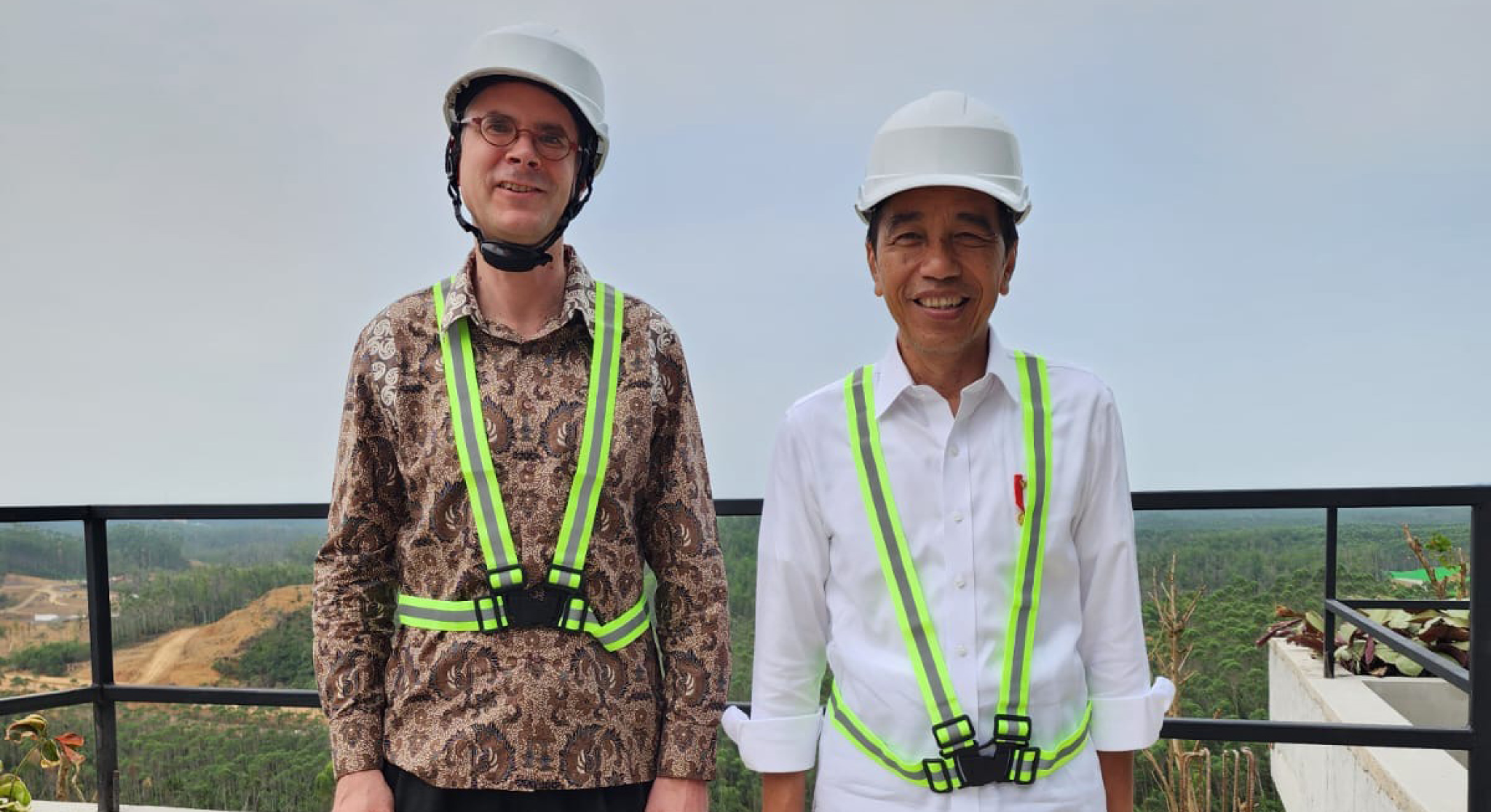Interviewing Indonesia’s outgoing President: A/Prof Marcus Mietzner writes about Jokowi

By Jiashu Fang and Olivia Wenholz
For A/Prof Marcus Mietzner, having an opportunity to interview Indonesian President Joko Widodo (popularly known as Jokowi) and writing a book about his 10-year presidency felt like a dream come true, but it certainly wasn’t without its challenges.
The upcoming book Ruling Indonesia: Jokowi's Presidency in an Age of Democratic Decline and Great Power Competition, by Associate Professor Marcus Mietzner from the Bell School’s Department of Political and Social Change (PSC), is expected to be published in late 2025 by the University of Michigan Press, subject to passing peer-review.
The book focuses on Jokowi’s ten-year presidency, and includes chapters about managing and sharing political power, infrastructure building and the economy, foreign policy, managing COVID, his relationship with democracy, and the struggle for succession. Ruling Indonesia presents the views of Jokowi through a critical lens, while providing him with a voice and platform to speak to a broad international audience. The book highlights that Jokowi’s presidency was characterised by his savvy use of power-sharing with a diverse range of coalition partners to achieve his priority goals in promoting infrastructure building, the area he cared deeply about. By contrast, he neglected institutional politics or surrendered this arena to other elites, causing democratic decline.
Mietzner made a deliberate choice to eschew theoretical jargon, preferring to use language suitable for a general readership. The book is pitched at readers who are interested in Indonesia, political affairs in the Global South, or just world politics in general, no matter if they are academics or not.
Becoming an Indonesian politics expert
For Mietzner, his interest in Indonesian politics began with a visit to his German childhood friend who lived in Jakarta in 1986, when Mietzner was 14 years old. He subsequently paid more visits to Indonesia for holidays and then enrolled in the Southeast Asian Studies program at the University of Frankfurt, where he took an Indonesian language course.
The rapid democratic transition in Indonesia in the late 1990s posed both great challenges and opportunities for Mietzner. As an ANU PhD Candidate doing fieldwork in Indonesia, he witnessed the fall of Suharto and the country’s transition to democracy. This rapid political shift also meant his existing research framework on the Indonesian military was ‘literally flowing down the river’ and had to be redesigned. The turn of events was followed by the arrival of numerous Western development agencies that wanted to be part of Indonesia’s transition. Thanks to his ANU supervisor, EmProf Harold Crouch (an eminent scholar of Indonesian and Malaysian politics), as well as Mietzner’s expertise in the Indonesian military, he was approached to work for USAID. This position allowed Mietzner to travel widely in Indonesia and opened doors for him to learn more about the military. He spent eight years at USAID, (longer than he intended) before completing his PhD, returning to academia and obtaining a full-time position at ANU in 2008.
Meeting Jokowi
Gaining access to interview Jokowi was never going to be an easy task. A few years after the completion of his PhD, Mietzner had shifted his research focus to Indonesia’s political parties and the institution of the presidency. After Jokowi’s inauguration in 2014, despite written requests, Mietzner did not get a chance to interview Jokowi for his book on the President’s coalition management, which was published in 2023 by Cornell University Press. This was not particularly unexpected for Mietzner, as he had written articles critical of Jokowi’s authoritarian tendencies, which he deemed to have weakened Indonesia’s democratic institutions.
It took Mietzner by surprise, therefore, that he was approached by Jokowi’s aide in July 2023 to write a book about his presidency. Apparently, Jokowi’s inner circle had convinced the President that a book about his presidency, written in English by an international academic, would be a good way to secure his legacy.
While thrilled by the rare opportunity, Mietzner also realised the importance of maintaining the book’s objectivity. Mietzner had no intention of writing a hagiography of Jokowi, so he put forward three conditions: there would be no financial compensation; Mietzner would have full editorial freedom, meaning that there would be no interventions by the president and his team; and Mietzner could freely choose the publisher. Jokowi and his team agreed, which was echoed by the President in their first meeting, when Jokowi said “Just write the good and the bad”. Since there would be no payment from the President’s office, it was fortunate that Mietzner had been awarded an ARC grant on presidentialism in Indonesia, which would support his research.
Thus, in contrast to what people tend to associate with writing about a president, during the multiple research trips over the course of a year, Mietzner was neither given a VIP-level reception, nor did Jokowi’s aides organise everything for him.
“Some people thought I would be driven around in a chauffeured car and picked up at the airport. But it wasn’t like that at all. I actually walked or took the train or subway to most of my meetings.”
Interviewing Jokowi
Mietzner conducted six formal sit-down interviews with Jokowi over the course of one year, between July 2023 and July 2024, in three different locations. Each session focused on one theme and lasted between 45 minutes and two and a half hours, which later served as the foundation of each chapter. In addition, Mietzner also had a chance to observe Jokowi’s interactions with aides, ministers, and crowds.
Mietzner followed Jokowi on his work trips for four days in Solo (Jokowi’s hometown), Samarinda in East Kalimantan, and Nusantara. As the President had given Mietzner open access to the cabinet, Mietzner was able to interview 23 incumbent and former ministers and cabinet-level officials. Moreover, Mietzner organised meetings with a diverse range of people who were close to Jokowi, or critical of his presidency, including human rights activists, observers, economists, and pollsters.

A significant challenge in interviewing Jokowi was making sure that he was expressing his authentic, personal views rather than what staff had prepared for him. Much like other political elites, Jokowi obviously aimed to present himself in the best possible light when being interviewed. Mietzner had to submit questions to Jokowi’s office before an interview session, and the aides would prepare scripted answers for Jokowi. How could Mietzner get the frank opinions and original thinking from the President, instead of official lines? Over time, Mietzner reduced the number of questions he submitted prior to an interview, and pulled Jokowi into free-flowing conversations. Often, Mietzner would disregard what Jokowi said if he was looking at prepared materials while answering. Instead, Mietzner encouraged Jokowi to speak his mind, and would come up with some sharp follow-up questions to get the President’s raw views.
‘When [Jokowi] got passionate about an issue and started gesturing... that's when I wrote down what he said because I knew it was his view rather than somebody else's.’
The interview tactics worked out pretty well. Most of the time Jokowi was open to questions that were not on the list, and never refused to answer them.
Mietzner thoroughly enjoyed interviewing and writing about Indonesia’s President. Being able to interview Jokowi and observe his day-to-day interactions, he was able to learn a lot more about Jokowi than what he would have been able to glean from secondary sources like TV or newspaper interviews. Having had access to Jokowi during a period of momentous political events – including when he arranged his succession – was a unique experience for Mietzner, even after having researched Indonesian politics for a quarter of a century.
I'm aware that this will never happen again. I will look back at this when I'm older as probably the highlight of my research career. There is no doubt about that.
A/Prof Marcus Mietzner is an Associate Professor in the Department of Political and Social Change, where he supervises PhD students. He also teaches undergraduate courses at the Coral Bell School of Asia Pacific Affairs, in the ANU College of Asia and the Pacific.